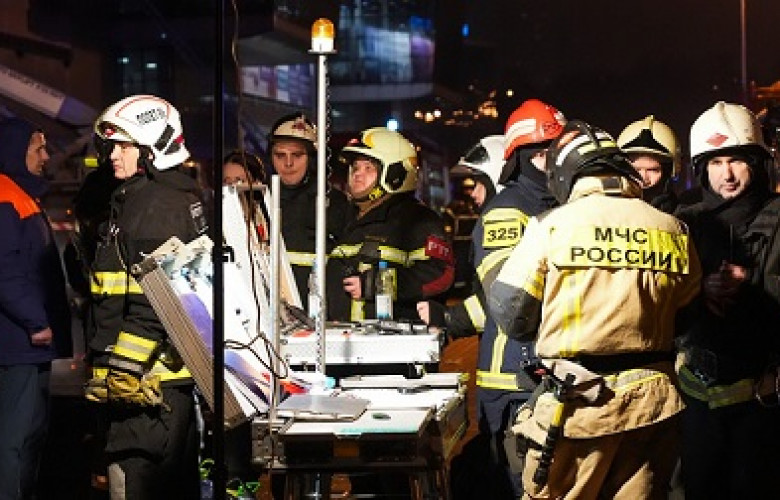Did Russia’s security agencies take their eye off the ball?
Ian Hill
2024-04-04
RUSSIA
DEFENCE AND SECURITY
This article first appeared on The Interpreter, published by the Lowy Institute

Russia’s worst domestic terrorist attack since the Beslan school siege 20 years ago has exposed some uncomfortable truths for the Kremlin.
There seems no reason to doubt Islamic State-Khorasan’s (IS-K) claim of responsibility for the atrocity that left 144 confirmed deaths at Crocus City Hall in Moscow. Yet the Kremlin has been quick to blame Ukraine, without providing any evidence. That’s not surprising. Moscow wants to draw propaganda value from the attack, using it to demonise Kyiv and reinforce the Kremlin’s wider narrative that Russia faces an existential threat from hostile foreign forces.
But there’s another, more fundamental, reason why the Kremlin is so anxious to distract public attention from the serious lapse in domestic security that allowed such a brazen attack on a high-profile target.
Clearly, there were major failings on the part of the huge and pervasive Russian domestic security apparatus, including ubiquitous surveillance cameras around Moscow. But was this simply the result of incompetence or bureaucratic inefficiency within the security services? Or does it also suggest the FSB and other Russian security services didn’t have their eyes on the ball?
If so, it challenges the implicit bargain between Putin and the Russian people: acceptance of the Kremlin’s growing centralised power in return for assured domestic security and growing (relative) prosperity.
Yet over time, as in all closed and authoritarian systems, there has been a change in what domestic security means for the Kremlin.
Domestic terrorism was a major preoccupation for Putin during his first term, stemming from separatist Islamic groups in Chechnya and other restive regions in the North Caucasus. First, the September 1999 apartment bombings. Then the 2002 theatre hostage siege in Moscow. And finally, the Beslan school massacre in 2004.
After Putin sealed a Faustian bargain with ruthless Chechen leader Ramzan Kadyrov, effectively giving him carte blanche to crush his opponents and establish control over the republic, the domestic terrorism threat receded from public attention in Russia.
Increasingly, the Kremlin’s concept of domestic security has narrowed, acquiring a more overtly political character. Since the Bolotnaya protests of winter 2011-12, an increasingly intolerant Kremlin has reduced the space for political and social dissent. Domestic security has come to mean not so much the security of the Russian people but the security of the regime in the Kremlin.
The FSB and its fellow security agencies are essentially political agencies, taking their cue from the Kremlin’s priorities – which is regime survival above all. Their focus, then, has been on suppressing any domestic political opposition and snuffing out civil society.
So, it is perhaps not surprising that the risk posed by Islamic terrorist groups such as IS–K may not have been front of mind for the FSB and Russia’s other security agencies, especially when coupled with a much sharper focus on Ukraine since Russia’s full-scale invasion in February 2022 and the ongoing war there, occasionally spilling over into Russia itself.
In the current hostile international climate, it is also sadly unsurprising the Russian authorities were dismissive of recent American warnings about the risk of imminent terrorist action in Moscow. Indeed, inveterate suspicion and double-think evidently persuaded the Kremlin to assume such Western warnings were designed to cause uncertainty and panic among Russians.
To reassure Russians that it can safeguard their security, the Kremlin will now want to demonstrate it is being tough. Any clampdown will inevitably bear down heavily on Russia’s large population of Central Asian migrant workers. This group is already marginalised and suffers significant discrimination, likely now to intensify. The flaunting of the maltreatment of the suspected Crocus City Hall attackers while in police custody may shock foreign observers, but Moscow knows that such displays of robustness play well with its core Russian constituency.
Don’t expect any slackening of the security apparatus’ focus on ensuring regime survival. In Putin’s Russia, this political imperative will remain ineluctably the major priority for the FSB and other agencies. But the terrorist attack reminds the Kremlin, and its security apparatchiks, that ensuring regime security doesn’t depend just on neutralising domestic opponents, suppressing political dissent and extinguishing civil society. The focus needs to be wider.
Russians don’t expect much from their leaders, but they do expect them to be strong and effective at countering threats to public safety, such as terrorism. Regime survival and ensuring public security are, therefore, inextricably connected.
Membership
NZIIA membership is open to anyone interested in understanding the importance of global affairs to the political and economic well-being of New Zealand.